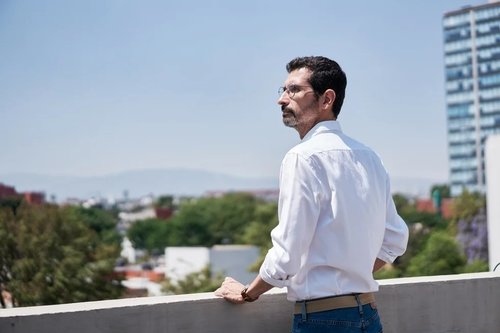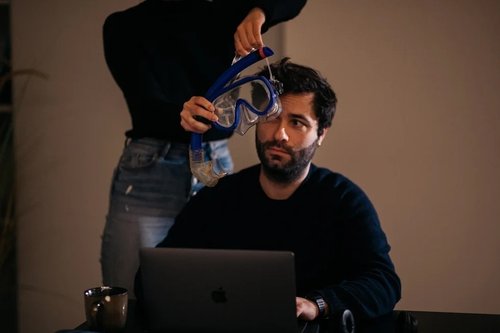What if working less isn't the answer?
10 avr. 2024
5min

GT
Independent journalist
Although an increasing number of us long for a four-day workweek, Julia Posca, a sociologist and researcher at Quebec’s Institute for Socioeconomic Research and Information (IRIS) in Canada says that working less will never be a miracle cure for dissatisfaction at work. Posca, whose work focuses on household debt, economic inequality and social policy, has written about this in her latest book, the title of which translates as Working Less is not Enough! That book is not available in English, so Welcome to the Jungle decided to ask Posca for her views on the four-day week and what needs to change in the world of work.
The first chapter of your book focuses on the four-day week. In it, you list the benefits identified by several studies. Can you cite some of them?
The four-day week is linked to better rest, more free time for yourself, [and] less stress when it comes to juggling that work-life balance as well as many advantages for companies. Employees are more rested and more motivated, and their productivity increases. They’re less inclined to leave the company and are less likely to be off sick. People who have experienced it report feeling happy to be spending less time commuting and to be spending more time with their loved ones.
What’s more, we can see how the four-day week (and not the five-day week crammed into four) would have a positive impact on the environment. For example, the countries that work longer hours on average have the highest greenhouse gas levels. Likewise, reducing journeys and commuting automatically results in fewer greenhouse gas emissions.
Despite all these benefits, you argue that ‘working less isn’t enough.’ What do you mean by that?
Working less certainly would mean significant social progress. It would also fit into a historic trend: Today, we work about half as many hours as we did two centuries ago, thanks to everyone who fought for that. But working less does not challenge the notion of maximizing profits at the expense of workers and the environment. It won’t make our work any more meaningful or fulfilling. We can easily work less without calling into question demands on productivity and performance and, more broadly speaking, the capitalist system of our society, which is at the root of so many issues in the workplace.
It’s not just about working less, it’s mainly about working better: asking ourselves if what we do truly serves a purpose for society, whether the organization employing us respects individuals, the values we uphold, etc.
‘We uphold democracy as a model for society… And yet, we don’t experience it on a daily basis at the office. The place where we spend most of our time.’ – Julia Posca, sociologist and researcher
What should specifically change in the workplace then, beyond how long we spend there?
A very important factor, in my opinion, is the distribution of power. We uphold democracy as a model for society… And yet, we don’t experience it on a daily basis at the office, the place where we spend most of our time.
The highly hierarchical structure of most organizations contributes to the lack of recognition and the devaluing of certain essential jobs. We need to promote the development of organizations that place workers at the heart of decision-making and place collective decision-making at the heart of the economy, such as cooperatives.
We need to also challenge our production methods: rejecting outsourcing to countries where labor is cheaper or where workers’ rights are nonexistent, [rejecting] planned obsolescence, valuing jobs in accordance with how useful they are for society while of course protecting workers, [and] looking after their health and well-being.
‘It seems to me that it’s actually the model we live in that’s not practical – or sustainable.’ – Julia Posca, sociologist and researcher
Do you think then that certain ‘harmful’ activities should disappear? Should workers on oil rigs or traders all resign?
Certain activities should undoubtedly transform – not necessarily disappear. For example, finance that serves no purpose other than to accumulate capital is pointless, but it can also serve to redirect investment towards sectors that are truly beneficial to society.
It’s a bit more complicated for fossil fuel industries. Faced with the climate crisis, they should immediately cease all new oil projects – according to the International Energy Agency (IEA), this is vital to meet the commitments pledged by almost all states in the Paris Accord, which aims to limit global heating to less than 2°C and preferably 1.5°C. But we need to also think about what these companies can do instead and allow their employees to retrain and acquire new skills. These major changes require economic and environmental planning.
Among all the dysfunction in our working world, you highlight the discontent of farmers, some of whom are struggling to earn a decent living, even though they are feeding us.
This is symptomatic of that gap between usefulness and what is valued in our society! Of course, farmers are not the only ones. Jobs related to care are equally affected: carers, paramedics, people looking after the elderly in nursing homes, specialized youth workers, teachers. Working less wouldn’t harm these workers, but what’s more pressing is revaluing their work: giving them the means to do it properly, increasing their wages.
What would you say to people who say your ideas are interesting but not practical?
It’s clear that currently this agenda doesn’t look easy to implement, notably because we lack the time to envision it. That’s why some people believe that working less is a first step, which will allow us to free up time and organize ourselves to build another model for society.
But I find that it’s actually the model we live in that’s not practical – or sustainable. The environmental crisis is a disaster for all life and for our economy. Insurers already lack the means to cover the damage that will result.
Our way of life depends on the exploitation of miserable workers. Unrest is breaking out in countries across the world, not to mention the explosion in the number of cases of burnout and other work-related illnesses, because we still treat labor as something disposable… Not looking for alternatives is what’s actually “not practical.”
Which models could we draw inspiration from?
I’ve already cited cooperatives. But, broadly speaking, any organization with horizontal governance is useful. For example, there are cooperative creches in the childcare sector, which involve professionals in all decision-making, [and] community clinics built in the 1970s with the aim of defending the rights of people who are ill. Of course, we shouldn’t idealize these initiatives: nothing is ever perfect. But there are undoubtedly lessons to be learned from them.
‘Early retirement does absolutely nothing to prevent social inequalities and environmental destruction from perpetuating.’ - Julia Posca, sociologist and researcher
When concluding your book, you mention a new trend: financial independence, retire early (FIRE). Why do you think this isn’t such a good idea?
This trend has the merit of highlighting that our model is inadequate and rather individualistic. Saving enough money to be able to retire at 30 is not within everyone’s reach – contrary to what some will have you believe. A teacher can live a very frugal life, make every possible saving and this will still be out of reach.
It is the same for carers and for many other vital professions. Is it realistic to tell ourselves that we’re going to enjoy life while leaving these people to work for us? Not to mention that early retirement does nothing to prevent social inequality and environmental destruction from perpetuating. It’s the opposite of what seems to me to be the right direction: collectively defining what we value, what is worth plugging our efforts into. Perhaps if we did this, working less would be less of a pressing matter.
Translated by Jamie Broadway
Photo: Jean-François Hamelin for Welcome to the Jungle
Follow Welcome to the Jungle on Facebook, LinkedIn, and Instagram, and subscribe to our newsletter to get our latest articles every week!

Inspirez-vous davantage sur : A l'international

Germany trials the four-day workweek: “Free time is invaluable”
Germany's four-day workweek trial may be the solution to greater productivity, worker satisfaction, and work-life balance.
10 juin 2024

The Fuckup Nights movement: The art of sharing failures on stage
Discover the global movement fostering learning, community, and authenticity with Fuckup Nights co-founder Pepe Villatoro.
23 mai 2024

Why is Europe so eager to attract foreign workers?
Looking for work abroad? Now might be your chance. The European Union is facing labor shortages, prompting efforts to attract foreign workers.
22 mai 2024

Hangover leave? Pawternity PTO? Explore the world’s quirkiest paid leave initiatives
Need time off for your birthday, a breakup or simply a lack of motivation? In some countries, it's possible.
04 avr. 2024

This Japanese café makes you stay until you finish your work
It may be an unusual place, but this café helps lone workers to reconnect in a society where the collective still takes precedence...
24 janv. 2024
La newsletter qui fait le taf
Envie de ne louper aucun de nos articles ? Une fois par semaine, des histoires, des jobs et des conseils dans votre boite mail.

Vous êtes à la recherche d’une nouvelle opportunité ?
Plus de 200 000 candidats ont trouvé un emploi sur Welcome to the Jungle.
Explorer les jobs

